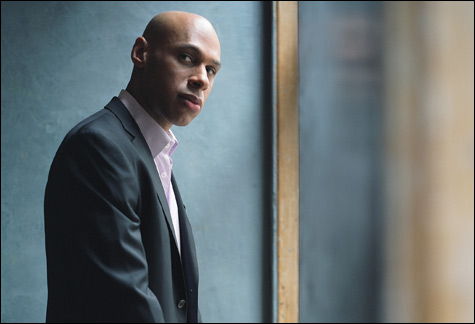
BLOODLINES: Back East reflects on many of Joshua Redman’s musical relationships, including the one with his father. |
It must be daunting to have Joshua Redman’s talent. Raised by a single mother of modest means in Berkeley, he graduated summa cum laude from Harvard and was accepted to Yale Law School in 1991, the same year he won first place in the Thelonious Monk competition. In no time, it seemed, he had moved to the forefront of modern jazz, joining heavy-hitting veterans as a sideman, leading his own bands on Warner Bros. (a label not known for mainstream jazz), and packing concert halls as few of his peers — or even his elders, including his dad, Dewey Redman — could.
Redman — who has a new album, Back East, on the Warner subsidiary Nonesuch and comes to Berklee this Sunday — was no joke. Even back then he had thoroughly absorbed the modern jazz language — particularly the saxophone language — of the past 40 years, and he played serious straight-ahead jazz in traditional acoustic quartets. If he lacked the overall technical mastery of, say, James Carter, he still played with fluency, power, and imagination. And if he lacked Carter’s taste for playing “outside,” he also had a better instinct than most for creating excitement in live performances. His solos took off — without faking or deploying cheesy theatrics, Redman created the kind of dramatic arch that could get an audience screaming. He was an honest player who could blow the roof off.

It’s been six years since he released his last acoustic jazz album as a leader. He’s been busy with the SFJazz Collective (he’s the artistic director of the San Francisco performing-arts organization from which it sprang) and with his Elastic Band, which has been exploring the electric-jazz tradition of Miles Davis, Weather Report, Herbie Hancock, and Eddie Harris.
Back East is a look back in many ways — to the East Coast jazz he listened to and played as a young star in his 20s, to the variety of “Eastern” musics his mother, the dancer Renee Shedroff, exposed him to as a child in Berkeley. It’s also an homage to saxophonists who inspired him, primarily Sonny Rollins, whose Way Out West essentially created the saxophone-trio tradition in 1957. And it pays tribute to Dewey Redman, who died in September of last year, and who plays on two tracks. On two other tracks, the guest saxophonists are Joe Lovano and Chris Cheek. (The rhythm teams are Larry Grenadier and Ali Jackson, Reuben Rogers and Eric Harland, Christian McBride and Brian Blade, all bass and drums, respectively; McBride and Blade join Redman at Berklee.)
On the album, you can hear Redman’s command as player and writer. His own pieces look East — with the gamelan-like melodic pattern of “Indonesia,” the Moroccan-tinged soprano of “Zarafah,” the raga-like scales of “Mantra #5.” The theme is complemented by the other composers: Coltrane’s “India” (on which Joshua plays with Dewey), Wayne Shorter’s “Indian Song,” even the Brooks Bowman standard, associated with Stan Getz, “East of the Sun (and West of the Moon).” Rollins gets two tunes from Way Out West, “I’m an Old Cowhand” and “Wagon Wheels,” and another that he’s recorded, “Surrey with the Fringe on Top.” Redman puts his stamp on these pieces with his Eastern-flavored arrangements. And his own hurtling “Back East” recalls Rollins’s “East Broadway Rundown” in its muscular attack and articulation.
“As a saxophone player, you can’t think of doing a saxophone trio record without thinking of Sonny Rollins,” he explains over the phone from Berkeley, “because he was the first, and arguably the greatest, to ever play in that format.” And besides, as he tells me, “As a saxophone player, he’s my biggest influence.”
It’s stunning to realize that despite his technical facility, Redman is essentially self-taught. There were a few odd lessons on piano and clarinet as a child, and visits to the Center for World Music in Berkeley with his mother. In Boston there were a couple of lessons with George Garzone of the Fringe. But mostly he learned through playing with his peers on the Boston scene: multi-instrumentalist Jorge Rossy (later the drummer with the Brad Mehldau trio), saxophonists Chris Cheek, Antonio Hart, Mark Turner, and Seamus Blake, pianist Victor Atkins, guitarist Kurt Rosenwinkel.
Until he was ready to turn away from his law career, he says, “music for me was always kind of a release. It was fun, an escape. I was a serious student from a pretty early age, so music was my antidote.” But then all that discipline turned to music. “I consider my teachers to be all the great musicians I listened to — people like my father and Ornette Coleman, Sonny Rollins and John Coltrane, many of whom I obviously never met — Dexter Gordon, Lester Young, Stan Getz. And also the great musicians I had a chance to play with once I moved to New York — my father, Charlie Haden, Pat Metheny, Billy Higgins, Roy Haynes, Jack DeJohnette, Paul Motian.” He adds, “A lot of what I’ve learned with jazz has come from listening and doing; it was a trial by fire — I had to learn by trying to keep up with musicians who I thought were way ahead of me.”